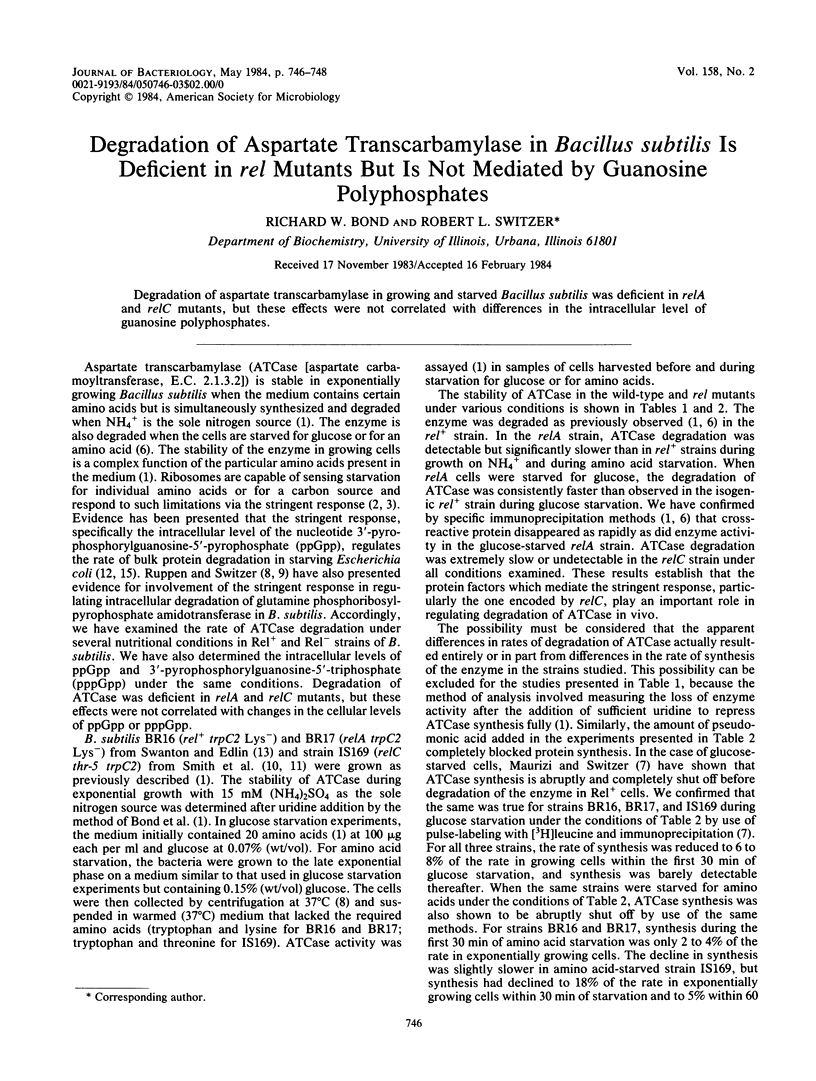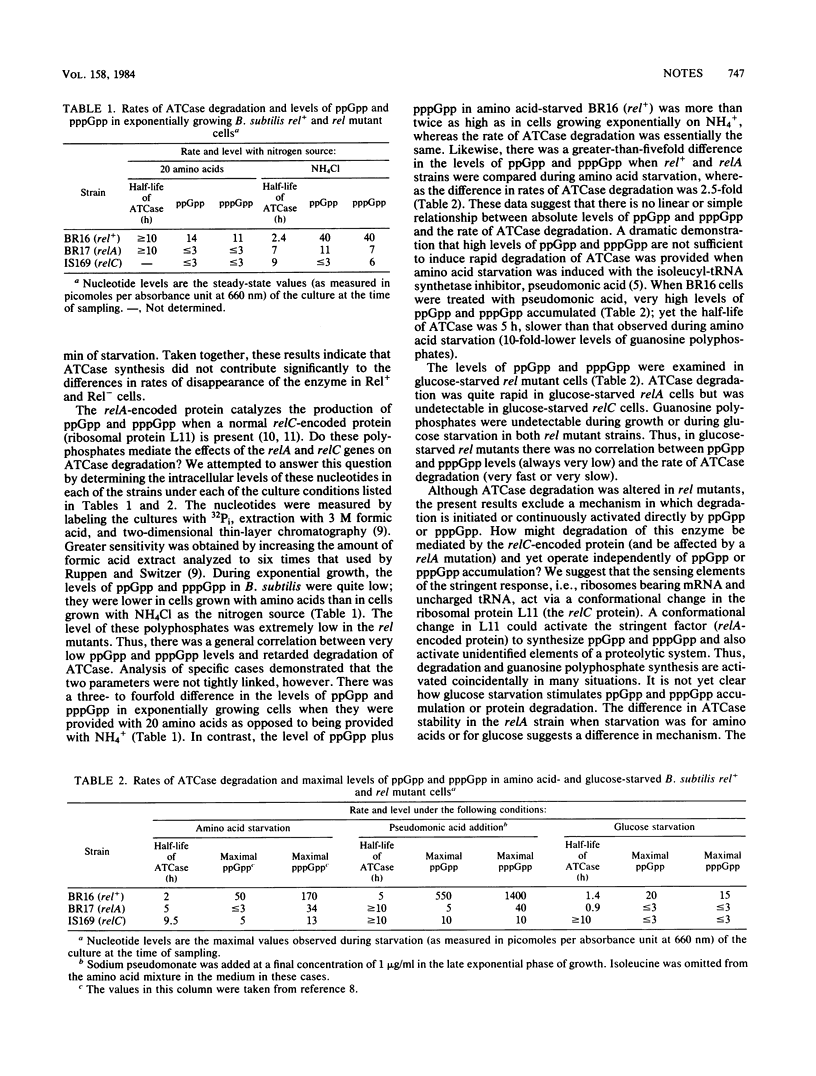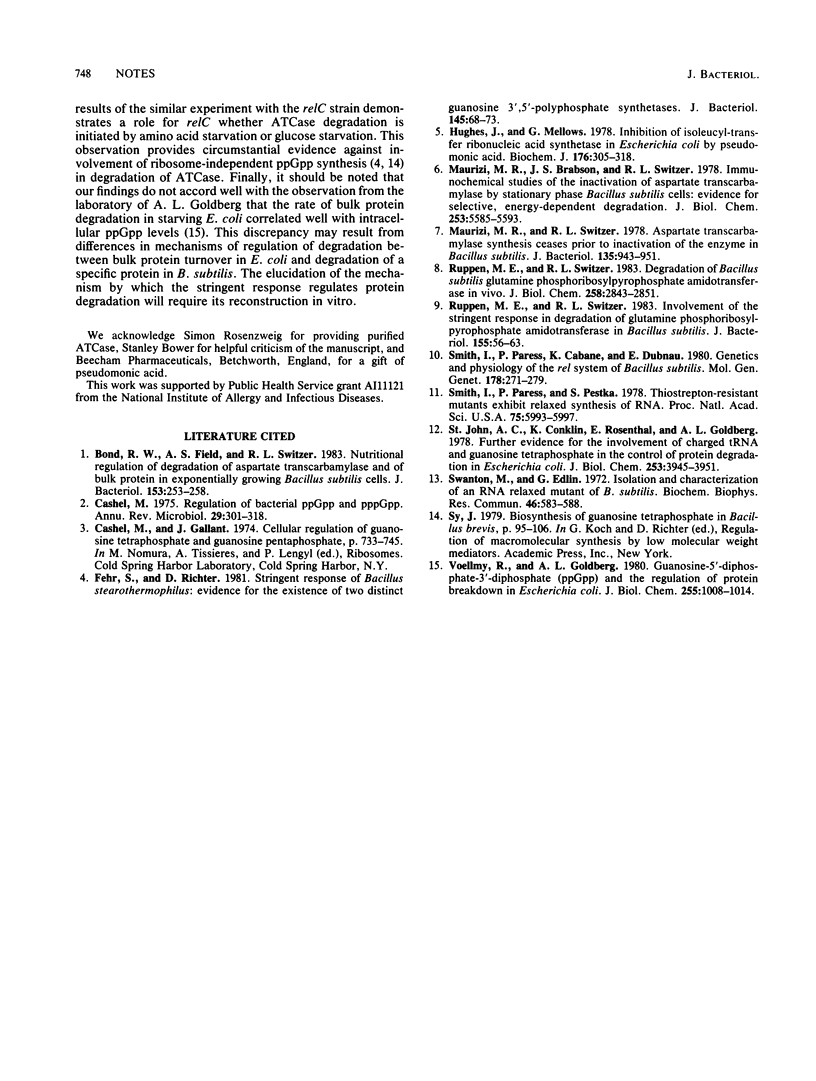Abstract
Degradation of aspartate transcarbamylase in growing and starved Bacillus subtilis was deficient in relA and relC mutants, but these effects were not correlated with differences in the intracellular level of guanosine polyphosphates.
Full text
PDF


Selected References
These references are in PubMed. This may not be the complete list of references from this article.
- Bond R. W., Field A. S., Switzer R. L. Nutritional regulation of degradation of aspartate transcarbamylase and of bulk protein in exponentially growing Bacillus subtilis cells. J Bacteriol. 1983 Jan;153(1):253–258. doi: 10.1128/jb.153.1.253-258.1983. [DOI] [PMC free article] [PubMed] [Google Scholar]
- Cashel M. Regulation of bacterial ppGpp and pppGpp. Annu Rev Microbiol. 1975;29:301–318. doi: 10.1146/annurev.mi.29.100175.001505. [DOI] [PubMed] [Google Scholar]
- Fehr S., Richter D. Stringent response of Bacillus stearothermophilus: evidence for the existence of two distinct guanosine 3',5'-polyphosphate synthetases. J Bacteriol. 1981 Jan;145(1):68–73. doi: 10.1128/jb.145.1.68-73.1981. [DOI] [PMC free article] [PubMed] [Google Scholar]
- Hughes J., Mellows G. Inhibition of isoleucyl-transfer ribonucleic acid synthetase in Escherichia coli by pseudomonic acid. Biochem J. 1978 Oct 15;176(1):305–318. doi: 10.1042/bj1760305. [DOI] [PMC free article] [PubMed] [Google Scholar]
- Maurizi M. R., Brabson J. S., Switzer R. L. Immunochemical studies of the inactivation of aspartate transcarbamylase by stationary phase Bacillus subtilis cells. Evidence for selective, energy-dependent degradation. J Biol Chem. 1978 Aug 25;253(16):5585–5593. [PubMed] [Google Scholar]
- Maurizi M. R., Switzer R. L. Aspartate transcarbamylase synthesis ceases prior to inactivation of the enzyme in Bacillus subtilis. J Bacteriol. 1978 Sep;135(3):943–951. doi: 10.1128/jb.135.3.943-951.1978. [DOI] [PMC free article] [PubMed] [Google Scholar]
- Ruppen M. E., Switzer R. L. Degradation of Bacillus subtilis glutamine phosphoribosylpyrophosphate amidotransferase in vivo. J Biol Chem. 1983 Mar 10;258(5):2843–2851. [PubMed] [Google Scholar]
- Ruppen M. E., Switzer R. L. Involvement of the stringent response in degradation of glutamine phosphoribosylpyrophosphate amidotransferase in Bacillus subtilis. J Bacteriol. 1983 Jul;155(1):56–63. doi: 10.1128/jb.155.1.56-63.1983. [DOI] [PMC free article] [PubMed] [Google Scholar]
- Smith I., Paress P., Cabane K., Dubnau E. Genetics and physiology of the rel system of Bacillus subtilis. Mol Gen Genet. 1980;178(2):271–279. doi: 10.1007/BF00270472. [DOI] [PubMed] [Google Scholar]
- Smith I., Paress P., Pestka S. Thiostrepton-resistant mutants exhibit relaxed synthesis of RNA. Proc Natl Acad Sci U S A. 1978 Dec;75(12):5993–5997. doi: 10.1073/pnas.75.12.5993. [DOI] [PMC free article] [PubMed] [Google Scholar]
- St John A. C., Conklin K., Rosenthal E., Goldberg A. L. Further evidence for the involvement of charged tRNA and guanosine tetraphosphate in the control of protein degradation in Escherichia coli. J Biol Chem. 1978 Jun 10;253(11):3945–3951. [PubMed] [Google Scholar]
- Swanton M., Edlin G. Isolation and characterization of an RNA relaxed mutant of B. subtilis. Biochem Biophys Res Commun. 1972 Jan 31;46(2):583–588. doi: 10.1016/s0006-291x(72)80179-7. [DOI] [PubMed] [Google Scholar]
- Voellmy R., Goldberg A. L. Guanosine-5'-diphosphate-3'-diphosphate (ppGpp) and the regulation of protein breakdown in Escherichia coli. J Biol Chem. 1980 Feb 10;255(3):1008–1014. [PubMed] [Google Scholar]


